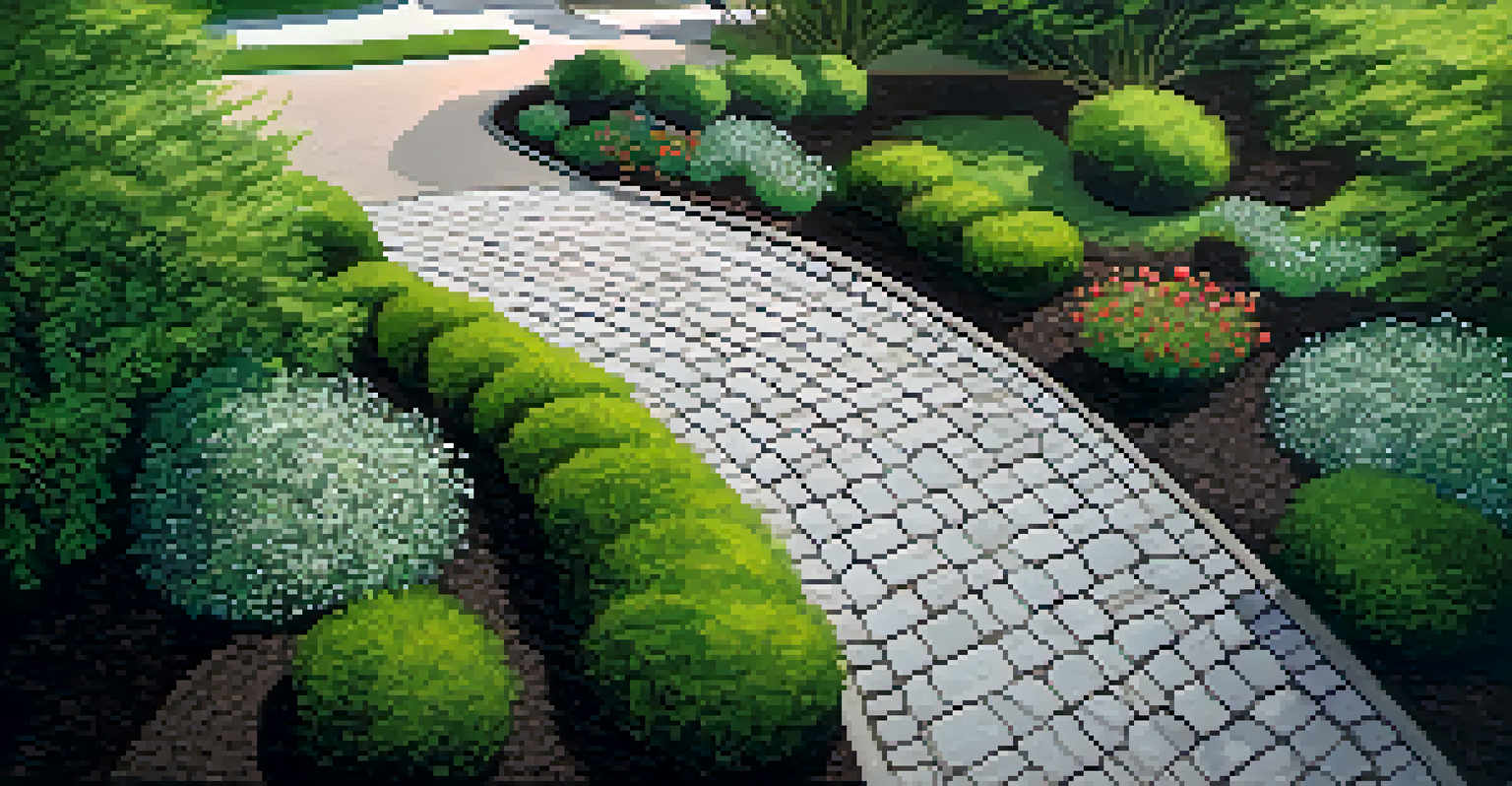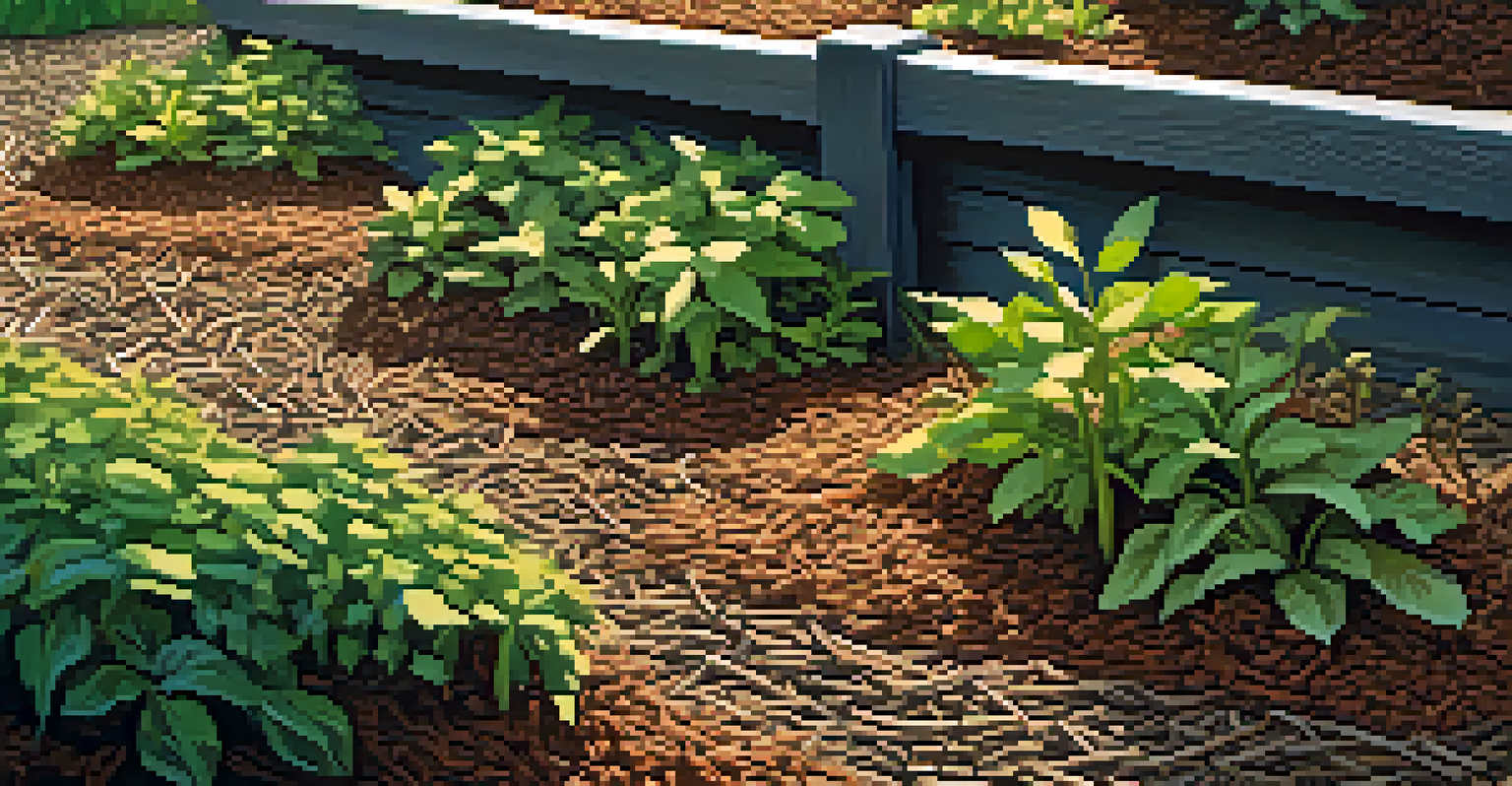Using Mulch to Promote Soil Health and Reduce Weeds

Understanding the Role of Mulch in Gardening and Landscaping
Mulch serves as a protective layer on top of the soil, playing a crucial role in gardening and landscaping. It helps retain moisture, regulate soil temperature, and prevent erosion, making it a gardener's best friend. Think of it as a cozy blanket for your plants, shielding them from extreme weather conditions.
Gardening requires lots of water, most of it in the form of perspiration.
By acting as a barrier against the sun, mulch also reduces the need for frequent watering, which is especially beneficial during hot summer months. This not only saves time but also conserves water, aligning with eco-friendly gardening practices. It’s a win-win situation for both your plants and the environment.
Moreover, mulch can enhance the aesthetic appeal of your garden, coming in various textures and colors. This visual enhancement, combined with its functional benefits, makes mulch a must-have in any gardening toolkit.
Types of Mulch: Organic vs. Inorganic Options
When it comes to mulch, you have two primary categories: organic and inorganic. Organic mulch includes materials like wood chips, straw, and grass clippings, which decompose over time, enriching the soil. In contrast, inorganic options such as rubber or gravel do not break down and can provide a long-lasting solution.

Choosing between organic and inorganic mulch depends on your soil health goals and aesthetic preferences. For instance, if you want to improve soil fertility, organic mulch is the better choice, while inorganic mulch may be ideal for pathways or areas where you seek durability.
Mulch Enhances Soil Health
Mulch adds nutrients and improves soil structure, fostering a thriving environment for plant roots.
It's important to note that organic mulch not only benefits the soil but also supports beneficial organisms like earthworms. These little helpers contribute to a thriving garden ecosystem, demonstrating how the right choice of mulch can have far-reaching effects.
How Mulch Improves Soil Health
Mulch improves soil health by adding nutrients as it breaks down, creating a rich environment for plant roots. The decomposition process releases vital minerals back into the soil, ensuring your plants receive the nourishment they need to flourish. It’s like giving your garden a nutrient boost without the hassle of chemical fertilizers.
The soil is the source of life, the foundation of our food, and the essence of existence.
Additionally, a layer of mulch helps prevent soil compaction by promoting better air circulation and water infiltration. This is crucial for root development, as compacted soil can suffocate roots and hinder their growth. Healthy roots lead to strong plants, which are more resilient against pests and diseases.
Lastly, organic mulch fosters a thriving ecosystem by providing habitat for beneficial microorganisms. These tiny allies work tirelessly to break down organic matter, further enhancing soil structure and fertility, showcasing how mulch is a simple yet powerful tool in your gardening arsenal.
The Weed-Reducing Magic of Mulch
One of the standout benefits of using mulch is its ability to suppress weed growth. By blocking sunlight, mulch creates an unfavorable environment for weed seeds to germinate. Imagine it as a shield that protects your garden from unwanted intruders, allowing your plants to thrive without competition.
Furthermore, when you apply a thick layer of mulch—around 2 to 4 inches—you're effectively smothering any existing weeds. This not only reduces their numbers but also lessens the need for chemical weed killers, making your gardening efforts more sustainable. It's an excellent way to keep your garden looking pristine without harsh interventions.
Mulch Reduces Weeds Effectively
By blocking sunlight, mulch suppresses weed growth, allowing plants to thrive without competition.
It's worth noting that while mulch significantly reduces weeds, it's not a complete solution. Regular maintenance and monitoring are still essential to ensure that your garden remains weed-free and healthy, reinforcing the idea that a proactive approach yields the best results.
Best Practices for Applying Mulch
To reap the full benefits of mulch, proper application is key. Start by clearing the area of any weeds or debris, ensuring a clean slate for your mulch layer. Once the area is prepped, apply mulch evenly, keeping it a few inches away from plant stems and trunks to prevent rot and encourage airflow.
It's also important to choose the right type of mulch for your specific plants and climate. For example, in wetter climates, a lighter mulch may be more appropriate to prevent excessive moisture retention. Conversely, in drier areas, a heavier mulch can help retain water, demonstrating how nuanced mulch application can be.
Lastly, remember that mulch isn't a one-time solution. Over time, it will break down and may need replenishing to maintain its effectiveness. Regularly checking your mulch layer ensures that your garden continues to thrive and remains weed-free.
Complementing Mulch with Other Soil Health Practices
While mulch is a powerful tool for promoting soil health and reducing weeds, it works best when combined with other practices. For instance, crop rotation and cover cropping can enhance soil structure and fertility, creating a holistic approach to gardening. By diversifying your strategies, you can create a more resilient garden ecosystem.
Incorporating compost into your garden is another excellent way to boost soil health. Compost enriches the soil and enhances the benefits of mulch by adding even more nutrients. Think of it as a dynamic duo, where each component complements the other, leading to a thriving garden.
Proper Mulch Application is Key
Applying mulch correctly and replenishing it over time ensures its effectiveness in supporting plant health.
It's also beneficial to conduct regular soil tests to understand your garden's specific needs. This will allow you to tailor your mulch and other soil amendments effectively, ensuring that your plants receive the ideal conditions to flourish.
Conclusion: Embracing Mulch for a Thriving Garden
In conclusion, using mulch is a simple yet effective way to enhance soil health and minimize weeds. Whether you opt for organic or inorganic options, the benefits of mulch are undeniable. From moisture retention to nutrient enrichment, it’s a gardener's best-kept secret for a flourishing garden.
As you embrace mulch in your gardening journey, remember that it’s not just about aesthetics; it’s about creating a sustainable environment for your plants. By understanding the role of mulch and implementing best practices, you're setting the stage for a vibrant and healthy garden.

So, grab your favorite mulch and start layering it today! Your plants will thank you, and you'll enjoy the satisfaction of a thriving garden ecosystem.